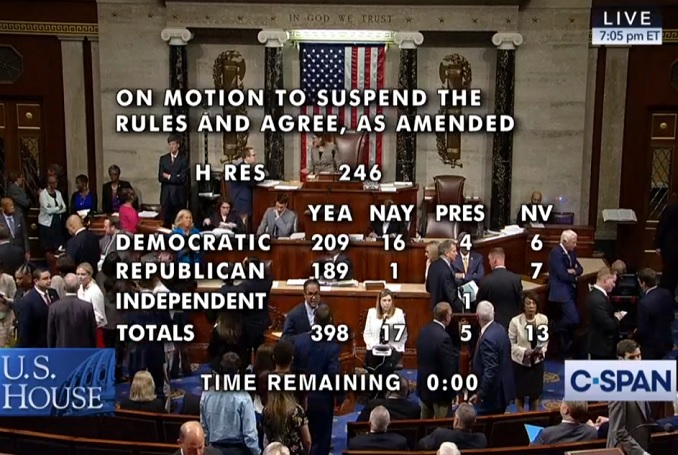
By Blake Alcott
The US House of Representatives on Tuesday, July 23, “resolved” by a vote of 398-17 that it “opposes the Global Boycott, Divestment, and Sanctions Movement (BDS) targeting Israel.” As the Palestine Chronicle reported on July 24, among those voting No were three of the famous women of color Trump recently infamously told to go back where they came from: Palestinian Rashida Tlaib, Alexandria Ocasio-Cortez and Ilhan Omar. The other Palestinian member of Congress, Justin Amash, who recently resigned from the Republican Party, abstained, while his fellow libertarian, Thomas Massie was the only Republican to vote No.
House Resolution 246
It’s about freedom of political expression and about the boycott of Israel, yes, but what does House Resolution 246, co-written by Israel lobby group AIPAC (the American Israel Public Affairs Committee), actually say?
It first tells us that BDS’s “target” is a “democratic, Jewish state”, setting up the conclusion that of course it must be totally wrong to boycott a democratic state. It then pays lip service to the US Constitution: US citizens do have “the rights” to “articulate political views, including with respect to the policies of the United States or foreign governments.” So, supporting BDS won’t put you in jail yet, but we, 398 members of Congress, are against it.
It then comes out for the two-state solution, which is only apparently unrelated: US policy is that “the Israeli and Palestinian people should be able to live in safe and sovereign states, free from fear and violence, with mutual recognition.” But shame on BDS: “The BDS Movement targeting Israel is a campaign that does not favor a two-state solution.” This is of course true, because one of the two states in the two-state solution is a racist one, one incompatible with Palestinian self-determination – Israel.
Also correctly, the next indictment is that “The BDS Movement seeks to exclude the State of Israel and the Israeli people from the economic, cultural, and academic life of the rest of the world”. Yes, this is the kind of non-violent pressure needed to get racist states to mend their ways.
Then comes the nub of the Resolution’s problem and the reason it was introduced in the first place, namely that BDS delegitimizes Israel: “The founder of the Global BDS Movement, Omar Barghouti, has denied the right of the Jewish people in their homeland [sic.], saying, ‘We oppose a Jewish state in any part of Palestine. No Palestinian, rational Palestinian, not a sell-out Palestinian, will ever accept a Jewish state in Palestine.’” This accurate quotation from one of BDS’s main founders is part of this brief but brilliant analysis by Barghouti.
At the very end of its charge sheet Resolution 246 then re-states this, its main beef with BDS, the issue of Israel’s illegitimacy: “The Global Boycott, Divestment and Sanctions Movement targeting Israel is… about questioning and undermining the very legitimacy of the country and its people.” The nonsensical hyperbole of a people being “illegitimate” evidently raised no objections on the House floor, and the text concludes: it is “Resolved that the House “opposes BDS… and all efforts to delegitimize the State of Israel.”
Israel is at Stake
So this is what the furore is about: delegitimizing Israel. The Israel lobby has for the last ten years seen the denial of its right to exist as its main international problem. Were a different, ‘nicer’ boycott movement to demand only, say, the two-state solution, the end of the occupation of the West Bank and the siege of the Gaza Strip, or the release of Palestinian political prisoners and the end of house demolitions, it would not get to the core of the problem of Zionism and would not get Israel so hot and bothered that it would spend millions trying to delegitimize it.
BDS’s three demands, if read logically, do entail the replacement of the colonial Jewish state with a normal democracy. And as this Resolution shows, the Zionist lobby knows this. The question for all BDS supporters is how to deal with this obvious conclusion. One can deny it, saying, like the UK’s only Palestinian Member of Parliament Layla Moran, for instance, that she “believes in Israel’s right to exist” and “a two-state solution”. Or one can embrace it in the negative language of abolishing Israel and thus committing political suicide (in the West). Or one can combine honesty with the positive language of Palestinian rights which, if fulfilled, would remove the Jewish state from Palestine but not remove or harm a single individual Jew.
For on this crucial question of where the colonial Jewish state put itself, Resolution 246 falls firmly into the fallacy of equating opposition to Israel or Zionism with opposition to any Jewish state, in principle: “The Global BDS Movement does not recognize, and many of its supporters explicitly deny, the right of the Jewish people to national self-determination.” This is baldly false. No BDS supporter has to take any stand whatsoever on the general question of Jewish national self-determination. BDS is against the colonization of the Palestinians’ homeland by anybody of any religion or ethnicity.
Future Votes
The day after the vote Black Congresswoman Ayanna Pressley, the fourth member of the so-called ‘squad’ of female women targeted by Trump, defended her Yes vote by wrongly claiming that the Resolution “does not infringe on 1st amendment rights” and adding that her vote “affirmed to my constituents raised in the Jewish faith Israel’s right to exist, a view I share as a supporter of a two state solution” – an explanation which casually reinforces the conflation between Judaism and Zionism.
Note that also voting Yes was Democratic presidential hopeful Tulsi Gabbard, while fellow hopeful Seth Moulton at least gave us some hope by abstaining. Likewise, while about half the 17 No votes came from Black Representatives, most of that group condemned BDS and violated the principle of free speech.
Most prominent in that group is veteran civil-rights fighter John Lewis, who on 16 July confusingly co-introduced, along with Representatives Tlaib and Omar, House Resolution 496 which “affirms that all Americans have the right to participate in boycotts in pursuit of civil and human rights at home and abroad, as protected by the First Amendment to the Constitution” and “opposes unconstitutional legislative efforts to limit the use of boycotts to further civil rights at home and abroad.”
It would seem hard for any Representative to vote No on Resolution 496, although the Israel lobby could argue that BDS is not “in pursuit of civil and human rights” at all, as the text contains as a qualifier, but is in pursuit of denying the rights of Jewish people. Here again, the pro-BDS Representatives must be able to emphasize the positive language of the civil and human rights of Palestinians which are as Barghouti said necessarily, by definition, violated by Israel’s presence in Palestine.
Not only would even the present US Supreme Court overturn any laws outlawing BDS, but Resolution 496 will command a majority and neutralize Resolution 246. But the AIPAC-owned House of Representatives has moved the debate a step in the only direction it logically can go, namely to the honest, stark choice between the Israeli state in Palestine and a democratic state in Palestine, one re-peopled by very many Palestinians who are now in exile and whose Right of Return is the central demand of BDS.
– Blake Alcott is an ecological economist and the director of One Democratic State in Palestine (England) Limited. The author welcomes any information on ODS or bi-nationalism activity sent to blakeley@bluewin.ch. He contributed this article to The Palestine Chronicle.

– Blake Alcott is a retired cabinetmaker and ecological economist who has been a solidarity activist since 2010, now living in Zürich. He is Director of ODS in Palestine (UK), an NGO working to make One Democratic State more understandable to the public. His 2023 book, The Rape of Palestine: A Mandate Chronology, consists of 490 instances of the dialogue, such as it was, between the British and the Palestinians during the years 1917-1948. He contributed this article to The Palestine Chronicle








